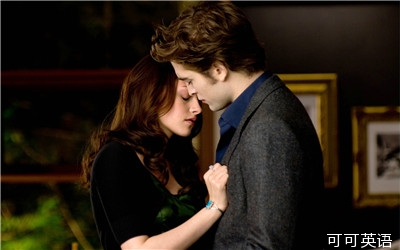He stopped, raising his eyebrows in blatant disbelief. Then he flashed a wide, wicked smile.
他停頓下來,明顯是難以置信地?fù)P起了眉毛。然后他露出了一個(gè)大大的壞笑。
"You really shouldn't have said that," he chuckled.
“你真的不應(yīng)該這樣說的。”他輕笑著說。
He growled, a low sound in the back of his throat; his lips curled back over his perfect teeth. His body shifted suddenly, half-crouched, tensed like a lion about to pounce.
他咆哮著,從喉嚨深處發(fā)出一陣低吼聲,他的嘴唇向后蜷起,露出了他完美無瑕的牙齒。他的身形忽然改變了,半蜷伏著身子,緊繃得像一只即將猛撲過來的獅子。
I backed away from him, glaring.
我瞪著他,向后退去。
"You wouldn't."
“你不會這樣做的。”
I didn't see him leap at me — it was much too fast. I only found myself suddenly airborne, and then we crashed onto the sofa, knocking it into the wall. All the while, his arms formed an iron cage of protection around me — I was barely jostled. But I still was gasping as I tried to right myself.
我根本沒看見他向我撲過來——這一切太快了。我只發(fā)覺自己忽然間就在半空中,然后我們一起撞到了沙發(fā)上,把它撞到了墻上。整個(gè)過程中,他的手臂一直像一個(gè)鐵籠子一樣保護(hù)著我——我沒有受到任何沖擊。但我依然透不過氣來,努力想讓自己在沙發(fā)上坐起來。
He wasn't having that. He curled me into a ball against his chest, holding me more securely than iron chains. I glared at him in alarm, but he seemed well in control, his jaw relaxed as he grinned, his eyes bright only with humor.
他不讓我這樣做。他讓我蜷伏在他的胸前,縮成了一個(gè)球。他的鐵臂緊緊地抱住我,比鐵鏈還要牢固。我有些擔(dān)憂地注視著他,但他顯然控制得很好,他的下頜松懈著,咧嘴一笑。他的眼睛很明亮,眼里只有笑意。
"You were saying?" he growled playfully.
“你在說什么?”他開玩笑似的咆哮著。
"That you are a very, very terrifying monster," I said, my sarcasm marred a bit by my breathless voice.
“我說,你是個(gè)非常,非常可怕的怪物。”我說道,但我的諷刺稍有些瑕疵,因?yàn)槲业穆曇粢廊挥行┐贿^氣來。
"Much better," he approved.
“這就好多了。”他深表贊許。
"Um." I struggled. "Can I get up now?"
“呃嗯,”我掙扎著。“我現(xiàn)在能起來了嗎?”
He just laughed.
他只是大笑著。
"Can we come in?" a soft voice sounded from the hall.
“我們能進(jìn)來嗎?”一個(gè)柔和的聲音在走廊外響起。

《暮光之城》
與圖書題目相得益彰的是,“暮光之城”系列別具匠心的封面設(shè)計(jì)則很好地傳達(dá)出了每本書內(nèi)在的深遠(yuǎn)寓意。斯蒂芬妮·梅爾指出《暮色》封面上的蘋果代表“創(chuàng)世紀(jì)” 內(nèi)善惡樹上的禁果。象征貝拉和愛德華之間人類與吸血鬼禁忌的愛戀。在書的開頭引用了“創(chuàng)世紀(jì)”217頁的內(nèi)容:“只是分別善惡樹上的果子,你不可吃,因?yàn)槟愠缘娜兆颖囟ㄋ馈!边@同時(shí)也代表了貝拉如何分辨善惡——選擇是否吃下那顆禁忌的果實(shí),這比喻了選擇跟愛德華在一起或遠(yuǎn)離他。











